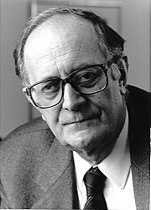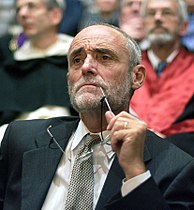International Committee of the Red Cross
The International Committee of the Red Cross (ICRC; French: Comité International de la Croix-Rouge) is a humanitarian organization based in Geneva, Switzerland, and is a three-time Nobel Prize laureate. The organization has played an instrumental role in the development of rules of war and promoting humanitarian norms.[3]
"ICRC" redirects here. For other uses, see ICRC (disambiguation).Formation
17 February 1863 (1863-02-17)
Protecting victims of conflicts and providing them with assistance
Geneva, Switzerland
Worldwide
15,448 (average number of ICRC staff in 2016)[2]
- Nobel Peace Prize
(1917, 1944, 1963)
State parties (signatories) to the Geneva Convention of 1949 and its Additional Protocols of 1977 (Protocol I, Protocol II) and 2005 have given the ICRC a mandate to protect victims of international and internal armed conflicts. Such victims include war wounded persons, prisoners, refugees, civilians, and other non-combatants.[4]
The ICRC is part of the International Red Cross and Red Crescent Movement, along with the International Federation of Red Cross and Red Crescent Societies (IFRC) and 191 National Societies.[5] It is the oldest and most honoured organization within the movement and one of the most widely recognized organizations in the world, having won three Nobel Peace Prizes (in 1917, 1944, and 1963).[6]
The foundation of national relief societies for wounded soldiers;
Neutrality and protection for wounded soldiers;
The utilization of volunteer forces for relief assistance on the battlefield;
The organization of additional conferences to enact these concepts in legally binding international treaties; and
The introduction of a common distinctive protection symbol for medical personnel in the field, namely a white armlet bearing a red cross, honouring the history of neutrality of Switzerland and of its own Swiss organizers by reversing the Swiss flag's colours.
Richard Heider. He was killed on 9 June 1942 in Greece.
Matthaeus Vischer. He was killed on 20 December 1943 in Indonesia.
Johann Jovanovits. He was killed on 4 February 1946 in Germany.
Otto Anderegg. He was killed on 16 May 1946 in Indonesia.
Charles Huber. He was killed on 19 November 1946 in Germany.
Georges Olivet. He was killed on 13 December 1961 in the Democratic Republic of Congo.
Robert Carlsson. He was killed on 30 July 1968 in Nigeria.
Dragan Hercog. He was killed on 30 July 1968 in Nigeria.
Jacob Sturzenegger. He was killed on 12 March 1975 in Vietnam.
Louis Gaulis. He was killed on 29 March 1978 in Lebanon.
Alain Bieri, André Tieche, Charles Chatora. They were killed on 18 March 1978 in Zimbabwe.
Christine Rieben. She was killed on 17 January 1980 in Uganda.
Jürg Baumann. He was killed on 21 September 1980 in Sudan.
André Redard. He was killed on 12 May 1982 in Angola.
Alain Jossi. He was killed on 28 October 1984 in Ethiopia.
Michel Zufferey. He was killed on 5 January 1985 in Sudan.
Marc Blaser. He was killed on 16 December 1985 in Angola.
Catherine Chappuis, Nuno Ferreira. They were killed on 14 October 1987 in Angola.
Pernette Zehnder. She was killed on 18 October 1987 in Lebanon.
Juanito Patong, Walter Berweger. They were killed on 19 January 1990 in the Philippines.
Mohammad Zamany. He was killed on 16 August 1990 in Afghanistan.
Yar Faqir. He was killed on 1 September 1990 in Afghanistan.
Peter Altwegg. He was killed on 6 October 1990 in Somalia.
Rais Khan, Mostu Khan. They were killed on 9 July 1991 in Afghanistan.
Anthony Arulanthu. He was killed on 24 October 1991 in Sri Lanka.
Wim Van-Boxelaere. He was killed on 14 December 1991 in Somalia.
Jón Karlsson. He was killed on 22 April 1992 in Afghanistan.
Frédéric Maurice. He died on 19 May 1992 at the age of 39, one day after a Red Cross transport he was escorting was attacked in the former city of Sarajevo.
Yugoslavian
Solomon Jarboe. He was killed on 26 August 1992 in Liberia.
Kurt Lustenberger. He was killed on 14 January 1993 in Somalia.
Sarah Leomy, Suzanne Buser. They were killed on 27 August 1993 in Sierra Leone.
Michel Kuhn. He was killed on 28 August 1993 in Tajikistan.
Antoine Munderere. He was killed on 13 October 1993 in Rwanda.
Angela Gago-Gallego, Julia Narrea. They were killed on 25 February 1994 in Peru.
Kiew Sambath. He was killed on 11 April 1994 in Cambodia.
Rodrigues Cambiote. He was killed on 13 August 1994 in Angola.
Fernanda Calado (Spain), Ingeborg Foss (Norway), Nancy Malloy (Canada), Gunnhild Myklebust (Norway), Sheryl Thayer (New Zealand), and Hans Elkerbout (Netherlands). They were shot at point-blank range while sleeping in the early hours of 17 December 1996 in the ICRC field hospital in the city of Nowije Atagi near Grozny. Their murderers have never been caught and there was no apparent motive for the killings.[34]
Chechen
Rita Fox (Switzerland), Véronique Saro (, formerly Zaire), Julio Delgado (Colombia), Unen Ufoirworth (DR Congo), Aduwe Boboli (DR Congo), and Jean Molokabonge (DR Congo). On 26 April 2001, they were en route with two cars on a relief mission in the northeast of the Democratic Republic of Congo when they came under fatal fire from unknown attackers.
Democratic Republic of Congo
(El Salvador). He was working as a water engineer in Afghanistan and travelling from Kandahar to Tirin Kot with local colleagues on 27 March 2003 when their car was stopped by unknown armed men. He was killed execution-style at point-blank range while his colleagues were allowed to escape. He was 39 years old. The killing prompted the ICRC to temporarily suspend operations across Afghanistan.[35] Thereby the assumption that ICRC's reputation for neutrality and effective work in Afghanistan over the past thirty years would protect its delegates was shattered.[36]
Ricardo Munguia
Vatche Arslanian (Canada). Since 2001, he worked as a logistics coordinator for the ICRC mission in Iraq. He died when he was travelling through Baghdad together with members of the Iraqi Red Crescent. Their car accidentally came into the crossfire of fighting in the city.
Nadisha Yasassri Ranmuthu (Sri Lanka). He was killed by unknown attackers on 22 July 2003, when his car was fired upon near the city of in the south of Baghdad.
Hilla
Emmerich Pregetter (Austria). He was an ICRC Logistics Specialist who was killed by a swarm of bees on 11 August 2008. Emmerich was participating in a field trip along with the ICRC Water and Habitat team on a convoy which was delivering construction material for reconstruction of a rural surgical health clinic in the area of Jebel Marra, West Darfur, Sudan.
Kristofer Scott. He was killed on 25 January 2011 in Liberia.
Khalil Dale. He was killed on 29 April 2012 in Pakistan.
Hussein Saleh. He was killed on 20 June 2012 in Yemen.
Abdul Bashir-Khan. He was killed on 29 May 2013 in Afghanistan.
Dieudonné Ruhamanyi, Pascal Barholere. They were killed on 20 November 2013 in the Democratic Republic of the Congo.
Siradjou Mamadou. He was killed on 8 March 2014 in the Central African Republic.
Michael Greub. He was killed on 4 June 2014 in Libya.
Laurent Du Pasquier (Switzerland). He was an Administration and Finance Manager in the city of Donetsk in Eastern Ukraine. He was killed by a shell which landed close to the ICRC's office on 2 October 2014. He was 38 years old.
Hamadoun Daou. He was killed on 30 March 2015 in Mali.
Mohammed Al-Hakami, Abdulkarem Ghazi. They were killed on 2 September 2015 in Yemen.
Alexis Marboua. He was killed on 12 October 2016 in the Central African Republic.
Emmanuel Lukudu, Ghulam Maqsood, Ghulam Rasoul, Ghulam Mortaza, Ahmad Khalid, Najibullah Sahebzada, Sayed Shah-Agha. They were killed on 8 February 2017 in Afghanistan.
Lorena Enebral-Perez. She was a physiotherapy specialist and requested a mission in Afghanistan where she could focus on children with disabilities. On 11 September 2017, while working at the ICRC's physical rehabilitation centre in Mazar-i-Sharif, Lorena was shot by a patient in a wheelchair. She was 38 years old.
Atteyipe Youssouf. He was killed on 4 November 2017 in the Central African Republic.
Hanna Lahoud. He was killed on 21 April 2018 in Yemen.
Saifura Hussaini. She was killed on 16 September 2019 in Nigeria.
Hauwa Liman. She was killed on 16 October 2019 in Nigeria.
Saidi Kayiranga, Ahmed Wazir, Hamid Al-Qadami, John Kaka. They were killed on 20 March 2020 in South Sudan.
Diomede Nzobambona. He was killed on 23 August 2021 in Cameroon.
At the end of the Cold War, the ICRC's work actually became more dangerous. In the 1990s, more delegates lost their lives than at any point in its history, especially when working in local and internal armed conflicts. These incidents often demonstrated a lack of respect for the rules of the Geneva Conventions and their protection symbols. Among the slain delegates were:
In 2011, ICRC launched the Health Care In Danger campaign to highlight risks to humanitarian healthcare workers.[37]
to monitor compliance of warring parties with the Geneva Conventions
to organize nursing and care for those who are wounded on the battlefield
to supervise the treatment of prisoners of war and make confidential interventions with detaining authorities
to help with the search for missing persons in an armed conflict ()
tracing service
to organize and care for civil populations
protection
to act as a neutral intermediary between warring parties
Guillaume Dufour,
(1787-1875)
Gustave Moynier,
(1826-1910)
Gustave Ador,
(1845-1928)
Max Huber,
(1874-1960)
Carl Burckhardt,
(1891-1974)
Alexandre Hay,
(1919-1991)
Cornelio Sommaruga,
(1932-2024)
Jakob Kellenberger,
(1944- )
Peter Maurer,
(1956- )
Mirjana Spoljaric Egger,
(1972- )
(1818-1898), co-founder
Louis Appia
(1978), author, lecturer and himalayist
Orianne Aymard
(1965-2022), writer
Laurence Boissier
(1903-1963), diplomat
Friedrich Born
(1891- 1974), diplomat, historian and writer
Carl Jacob Burckhardt
(1965), journalist and writer
Pierre Cormon
senior civil servant
Patricia Danzi
(1828-1910), founder
Henry Dunant
(1887-1963), historian
Marguerite Frick-Cramer
(1960), politician
Alfonso Gomez
(1874-1960), jurist, president of the ICRC
Max Huber
(1904-1961), physician
Marcel Junod
(1944), diplomat, president of the ICRC
Jakob Kellenberger
(1955), physician and senior civil servant
Daniel Koch
(1966), Director General
Pierre Krähenbühl
(1806-1869), surgeon, co-founder of the ICRC
Théodore Maunoir
(1826-1910), jurist, co-founder of the ICRC
Gustave Moynier
(1914-2002), Doctor of Law
Jean Pictet
(1932-2024), diplomat, president of the ICRC
Cornelio Sommaruga
(1971), diplomat, president of the ICRC
Mirjana Spoljaric Egger
International Committee of the Red Cross (ICRC)
- vidéo
Rules of war (in a nutshell)
Dr. Cornelio Sommaruga, President of the ICRC from 1987 to 1999, donated four hours of high-definition audiovisual life story interviews to Legacy. The ICRC audiovisual library houses copies of these interviews.
Legacy
on Nobelprize.org









